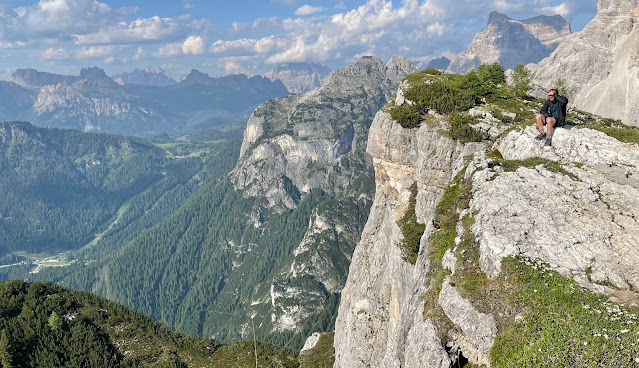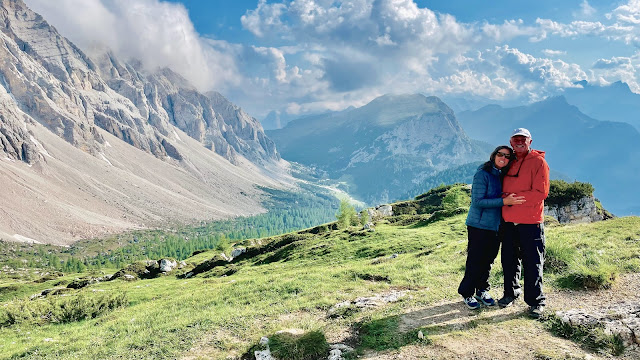 |
| Route of hike on Day 5 |
Now midway through the hike, we had attained our trail legs and felt at ease with the trail conditions and the terrain of the Dolomites. However, Day 5 turned out to be the longest of the whole trip at just under 15 miles. At mile 10, I began to feel hotspots on the soles of my feet and needed to take care of it before they blew-up into full-fledged blisters. And as I sat down to have Helen tend to my feet, my cell phone butt-dialed two friends just waking up at 7 AM in California (my apologies Don and Vincent). All in a days karma. The scenery on these two days was every bit as good as previous days - maybe even more spectacular if that is possible! And the weather cooperated nicely as you will see.
Day 5 - Refugio Cinque Torri to Staulanza
 |
| We said goodbye to the Cinqui Torri, one of the more famous landforms in the Dolomites |
 |
| A steep descent greeted us first thing in the morning - I likely frowned knowing that "up" was to follow |
 |
| Yes, there is a hiker (Helen) where the cliff "touches" the trail |
 |
| A southern view toward Passo Giau |
 |
| Looking back to the north from near Passo Giau - Monte Ragusela rises above |
 |
| From Passo Giau looking east toward Monte Antelao - another distinct and separate massif in the Dolomites |
 |
| A glaciated valley points toward Marmolada, the highest peak in the Dolomites at 10,968 feet |
 |
| The trudge up to Forcella Giau looking northwest - note the northeast dip on the strata |
 |
| Finally! Something other than white Triassic limestone - a brown shale and sandstone |
 |
| Moving easily from Passo Giau toward the east with Mount Pelmo looming in the distance |
 |
| The size of the boulders was astounding but even they were dwarfed by the immense relief of the mountains |
 |
| This was a relatively easy passage toward Forcella (Pass) Ambrizzola - and oh, so scenic! |
There were a few interpretive signs along the way and some of them had English translations. Below is a cross-section seen along the trail near Forcella Ambrizzola, along with an English translation on the formation of the Dolomites. The text looks to be a direct translation from Italian to English. A translation by me of the signed translation is as follows:
The modern appearance and spectacular formation of the Dolomites is the result of multiple events over long spans of geologic time, that act together to make these mountains unique. And it is the presence of alternating rock types - harder layers that form plateaus and cliffs - and softer rocks that weather and degrade readily to form slopes and valleys. This combination yields the varied topography of peaks and valleys. The last part about French mineralogist Dolomieu is readily understood. Not mentioned here are the glaciers that swept through the Dolomites to excavate the deep valleys. The red lines below are faults. The reference to hydrochloric acid means that limestone will readily fizz when in contact with HCl but dolomite (or dolostone as it is now being called) will only fizz with Hal after being powdered with a sharp instrument.
 |
| Cortina d'Ampezzo, seen from Forcella Ambrizzola, will host three Olympic events in 2026 |
 |
| Rest stop along the trail with a fantastic view of Mt. Pelmo in the distance, elevation 10,394 feet |
 |
| Triassic limestone and flowers frame a view of Mt. Pelmo |
 |
| Along the road in the left distance is where I developed some hot spots on my feet |
 |
| Graceful Mt. Pelmo |
 |
| Recent rocks from a debris flow issue from a drainage at the foot of Mount Pelmo on our way to Staulanza |
 |
| What a relief to see the forest where Staulanza is located - 15 miles! |
Day 6 - Refugio Staulanza to Refugio Tissi
 |
| Route of hike on Day 6 - solid blue line is by taxi; dashed yellow line by foot. |
Three miles on pavement did not sound enticing to our small group and so we opted to take a short taxi ride to save three miles of frustrating walking. The cost was 40 Euros. We were let off at Malga Vescova, a small farm where we began our uphill climb to Refugio Coldai of about 1,450 feet. It was pleasant walking in bright sunshine, with some flat areas to admire the scenery.









































No comments:
Post a Comment
If your comment will not post, email me with the problem.